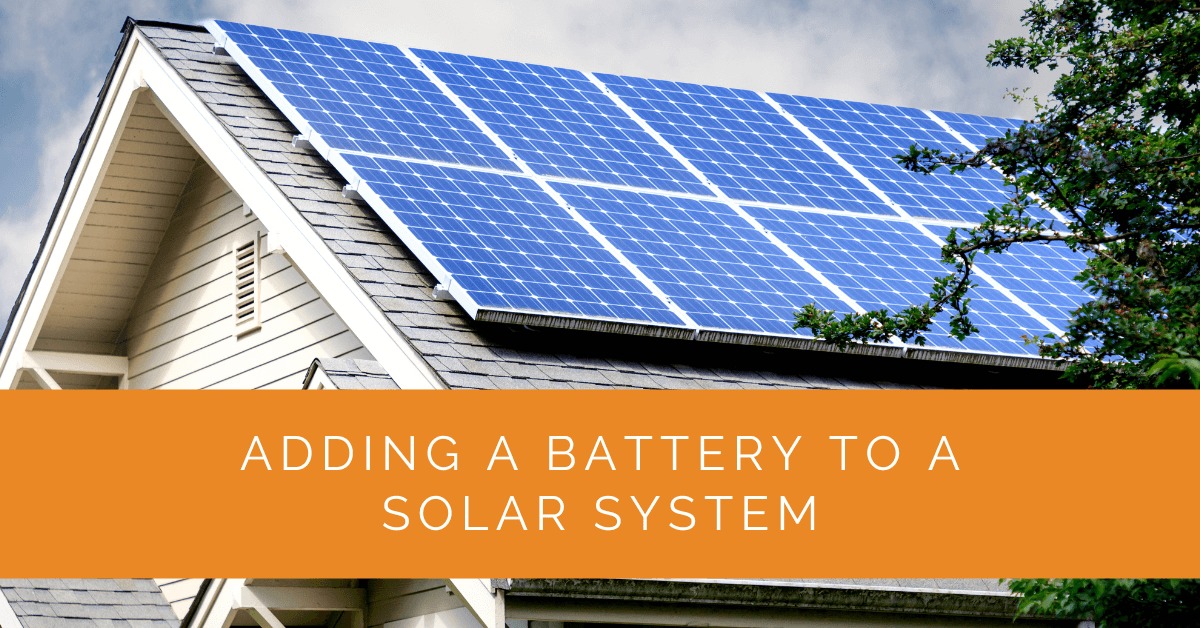Renewable energy systems like solar power provide clean and sustainable electricity. However, adding battery storage to your existing solar system can enhance its performance and resilience. This article will explore the benefits and steps involved in adding a battery to your solar system, empowering you with energy independence, backup power, and increased self-consumption.
Contents
- 1 Key Takeaways
- 2 Assessing Your Existing Solar System
- 3 Selecting the Right Solar Panel Battery System
- 4 Installation and Integration
- 5 Benefits and Considerations
- 6 Case Study: Enhancing Solar Efficiency with Battery Integration
- 7 Expert Insights From Our Solar Panel Installers About Adding a Battery to a Solar System
- 8 Experience Solar Excellence with Us!
- 9 Conclusion
- 10 FAQ
Key Takeaways
- Adding a battery to your solar system offers energy independence, backup power, and increased self-consumption.
- Assessing system compatibility, selecting the right battery system, and ensuring proper installation is crucial for maximizing energy storage benefits.
- Considerations include upfront costs, maintenance requirements, system scalability, and compliance with grid connection standards.
Assessing Your Existing Solar System
Before adding a battery to your solar system, a thorough assessment of your existing setup is essential. This assessment will ensure compatibility and determine the optimal approach for integrating battery storage.
Evaluating System Compatibility and Capacity
To begin, evaluate the compatibility of your existing solar system with battery integration. Check if your solar inverter supports battery connectivity or if additional equipment is required. Additionally, consider the capacity of your solar array. Assess whether it generates sufficient energy to charge the batteries effectively and meet your energy needs.
Energy Consumption Analysis for Optimal Sizing
Analyzing your energy consumption patterns is crucial for properly sizing the battery system. Review your historical energy usage data to understand consumption trends and identify peak demand periods. This analysis will help determine the energy storage required to optimize system performance and provide backup power during critical times. Consider factors such as the size of your household, specific energy requirements, and any future expansion plans.

Selecting the Right Solar Panel Battery System
Selecting the appropriate battery system is crucial in enhancing your solar setup. Consider the following factors to make an informed decision:
Types of Solar Batteries and Their Characteristics
Familiarize yourself with the different types of solar batteries available, such as lithium-ion and lead-acid batteries. Each type has its own characteristics, including energy density, cycle life, efficiency, and maintenance requirements. Research the pros and cons of each battery chemistry to determine which aligns best with your needs and budget.
Sizing the Battery System for Optimal Performance
Properly sizing the battery system ensures it can meet your energy storage requirements. Consider factors such as the depth of discharge (DoD), which refers to the capacity utilized before recharging. A deeper DoD allows for more usable energy but may impact the battery’s lifespan. Calculate the storage capacity needed based on your energy consumption analysis and desired backup power duration. It’s crucial to balance capacity, cost, and longevity to achieve your battery system’s optimal performance and longevity.
Installation and Integration
Once you have selected the right battery system, the installation and integration process can begin. Proper installation is crucial for your solar system’s safe and efficient operation with battery storage.
System Design Considerations and Safety Measures
During the design phase, consider the placement and mounting of the battery storage units. Choose a suitable location that provides proper ventilation, protects the batteries from extreme temperatures, and allows easy maintenance. Additionally, ensure compliance with electrical codes and safety regulations to guarantee a safe and reliable system. This includes proper wiring, grounding, and circuitry modifications to accommodate the battery integration.
Connection and Integration Process
The connection and integration of the battery system into your existing solar setup require precision and expertise. Connect the battery system to the solar inverter and electrical panel according to manufacturer guidelines and applicable codes. Install necessary charge controllers and monitoring systems to facilitate efficient charging, prevent overcharging or discharging, and enable real-time system performance monitoring. Thorough testing and commissioning are vital to ensure the seamless operation of the integrated solar and battery system.

Benefits and Considerations
Adding a battery to your solar system offers numerous benefits but entails certain considerations and limitations. Understanding these aspects will help you make an informed decision and maximize the advantages of energy storage.
Benefits of Adding Battery Storage
The addition of battery storage to your solar system brings several benefits:
- Energy Independence: Store excess solar energy during low solar production or power outages, reducing reliance on the grid and enhancing self-sufficiency.
- Backup Power: A battery system provides reliable backup power, ensuring critical appliances and devices’ continuity during grid outages.
- Peak Demand Reduction: By storing excess energy during off-peak periods and utilizing it during peak demand times, adding a battery reduces your reliance on the grid and potentially lowers electricity costs.
- Increased Self-Consumption: With a battery system, you can maximize the self-consumption of solar energy by storing excess energy generated during the day for use during the evening or periods of low solar production.
- Grid Stabilization: Adding battery storage to your solar system contributes to grid stability by providing a buffer for energy supply and demand fluctuations. This helps promote a more reliable and resilient grid infrastructure.
Considerations and Limitations
While the benefits of adding battery storage to your solar system are significant, it’s important to be aware of certain considerations and limitations:
- Upfront Costs and Return on Investment: Adding a battery system involves an initial investment. Assess the upfront costs, including the batteries, installation, and upgrades to the existing system. Consider the potential long-term savings regarding reduced electricity bills and incentives or rebates.
- Maintenance and Lifespan of Solar Batteries: Different battery chemistries have varying maintenance requirements and lifespans. Regular maintenance, such as monitoring battery performance, ensuring proper ventilation, and adhering to manufacturer guidelines, is necessary to maximize the lifespan and efficiency of the battery system.
- System Scalability and Future Expansion: Consider the scalability of the battery system and its compatibility with potential future expansions or upgrades to your solar system. Ensure that the chosen battery technology allows for easy integration of additional storage capacity if your energy needs change over time.
- Grid Connection and Utility Requirements: Adding a battery to your solar system may involve compliance with specific interconnection standards and utility regulations. Understand the requirements of your local utility company to ensure seamless integration and compliance with safety and grid connection guidelines.
Case Study: Enhancing Solar Efficiency with Battery Integration
Background
At Solar Panels Network USA, we pride ourselves on offering comprehensive solar solutions that meet the evolving needs of our clients. One of our recent projects involved adding a battery system to an existing solar installation for a residential customer aiming to achieve greater energy independence and resilience.
Project Overview
Our client, a homeowner with an existing solar panel system, sought to enhance their setup by integrating battery storage. They were motivated by the desire to reduce reliance on the grid, secure backup power during outages, and maximize the self-consumption of their solar energy. We embarked on a detailed assessment to ensure the compatibility and optimal performance of the new battery system.
Implementation
System Assessment and Planning
We began with a thorough evaluation of the client’s current solar setup, analyzing the system’s capacity, inverter compatibility, and overall energy production. Using historical data on their energy consumption patterns, we identified peak demand periods and calculated the required storage capacity to meet their goals.
Battery Selection and Sizing
After careful consideration, we recommended a high-capacity lithium-ion battery due to its superior energy density, efficiency, and longer lifespan. The selected battery system was sized to provide sufficient backup power for essential appliances and to store excess solar energy generated during the day for use during peak evening hours.
Design and Safety Considerations
We designed the system to ensure proper placement and ventilation for the battery units, protecting them from extreme temperatures and allowing for easy maintenance. Compliance with local electrical codes was a priority, ensuring all wiring, grounding, and circuitry modifications were conducted safely.
Connecting the Battery System
The installation process involved connecting the battery system to the existing solar inverter and electrical panel. We installed charge controllers and a monitoring system to facilitate efficient energy management, prevent overcharging, and enable real-time performance tracking. Rigorous testing and commissioning were conducted to ensure seamless operation.
Results
Energy Independence and Backup Power
Post-installation, the client experienced immediate benefits. The battery system provided reliable backup power during grid outages, ensuring the continuity of critical appliances. The client reported a significant reduction in reliance on the grid, with the ability to store and use excess solar energy effectively.
Enhanced Self-Consumption and Cost Savings
By utilizing stored solar energy during peak demand periods, the client maximized their self-consumption and reduced electricity costs. The net metering arrangement allowed them to earn credits for excess energy fed back into the grid, further enhancing their savings.
Summary
The integration of a battery system into the client’s existing solar setup successfully achieved their goals of energy independence, backup power, and increased self-consumption. This project highlights the importance of a detailed assessment, careful selection of components, and expert installation to ensure optimal performance and longevity.
At Solar Panels Network USA, we continue to empower homeowners with innovative solar solutions that not only provide financial benefits but also contribute to a more sustainable future. Our commitment to quality and customer satisfaction ensures that every project is tailored to meet the unique needs of our clients, maximizing the benefits of solar energy.
Expert Insights From Our Solar Panel Installers About Adding a Battery to a Solar System
Integrating a battery into your existing solar system can significantly enhance energy independence and provide reliable backup power during outages. It’s a game-changer for those looking to maximize their solar investment.
Lead Solar Installer
Properly sizing and selecting the right battery system is crucial. Assess your energy consumption patterns and future needs to ensure you get the most out of your solar energy storage.
Senior Solar Technician
Safety and compatibility are paramount when adding a battery to your solar setup. Ensuring compliance with electrical codes and proper installation practices can safeguard your system’s efficiency and longevity.
Solar Installation Specialist
Experience Solar Excellence with Us!
Trust in Solar Panels Network USA, where our seasoned experts deliver top-quality solar solutions for homes and businesses nationwide. With a legacy of countless successful installations and a commitment to sustainable energy, we’re your reliable partner in the solar journey. Ready for a brighter, eco-friendly future? Call us now at (855) 427-0058 and harness the power of the sun!
Conclusion
Adding a battery to your solar system opens up new possibilities for energy independence, backup power, and increased self-consumption. By assessing your existing solar system, selecting the right battery system, and ensuring proper installation and integration, you can maximize the benefits of solar energy storage.
Remember, adding a battery to your solar system involves careful planning, professional assistance, and consideration of system compatibility, energy consumption patterns, battery selection, installation, and maintenance. Consult with solar energy professionals to guide you through the process and help you make the most informed decisions for your energy needs.
With the integration of battery storage, your solar system can provide reliable power during outages, optimize self-consumption, and contribute to a greener and more sustainable energy future. Embrace the potential of adding a battery to power your home and harness the full benefits of solar energy!
FAQ
Can you add a battery to an existing solar system?
Yes, adding a battery to an existing solar system is possible. However, compatibility with the existing system and space availability for installation should be considered. Consult with a solar energy professional to assess the feasibility and requirements for integrating a battery into your setup.
What does it cost to add a battery to my solar system?
The cost of adding a battery to your solar system can vary depending on factors such as the size and capacity of the battery, the type of battery chemistry chosen, installation requirements, and any necessary system upgrades. Obtaining quotes from reputable solar installers is recommended for an accurate cost estimate tailored to your needs.
Should you install a battery with solar panels?
The decision to install a battery with solar panels depends on your specific goals and requirements. Adding a battery can be beneficial if you seek energy independence, backup power during outages, and increased self-consumption of solar energy. However, evaluating the cost, potential savings, and payback period is essential to determine if it aligns with your energy goals.
Is it a good idea to get a battery with solar panels?
Adding a battery to your solar panel system can be a good idea if you value energy independence, backup power, and maximizing the utilization of self-generated solar energy. It provides additional flexibility and resilience to your solar system. However, it is important to carefully assess your energy needs, the cost implications, and the maintenance requirements to determine if it is the right choice for your specific circumstances. Consulting with solar energy professionals can help you make an informed decision.
About the Author
Solar Panels Network USA stands at the forefront of solar energy solutions, driven by a team of seasoned solar engineers and energy consultants. With over decades of experience in delivering high-quality solar installations and maintenance, we are committed to promoting sustainable energy through customer-centric, tailored solutions. Our articles reflect this commitment, crafted collaboratively by experts to provide accurate, up-to-date insights into solar technology, ensuring our readers are well-informed and empowered in their solar energy decisions.

